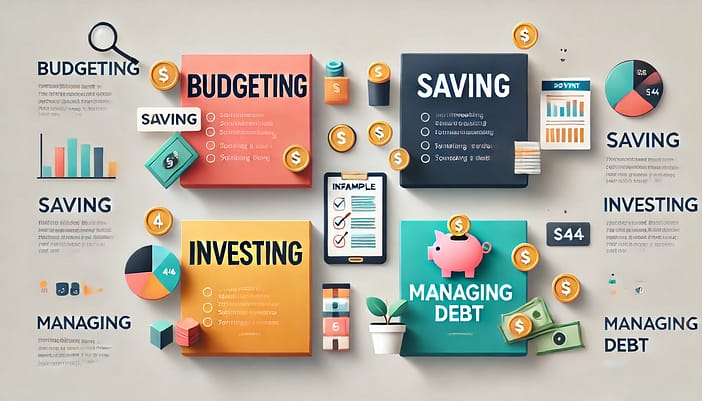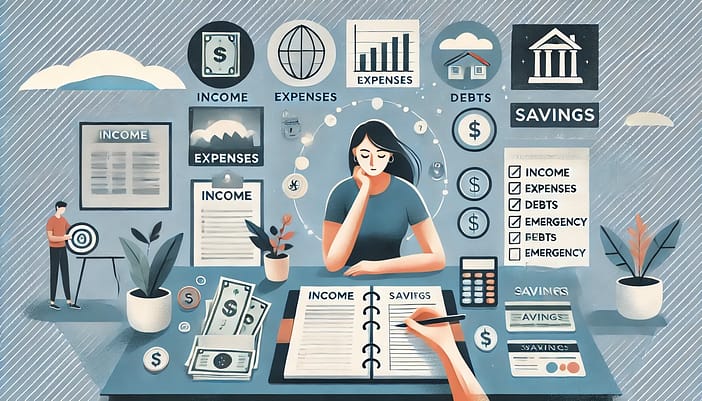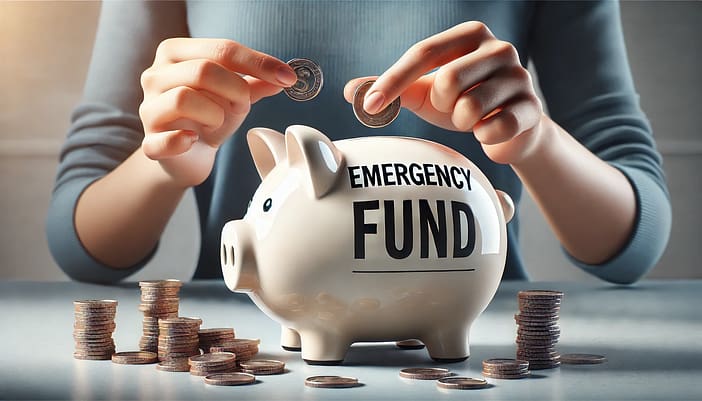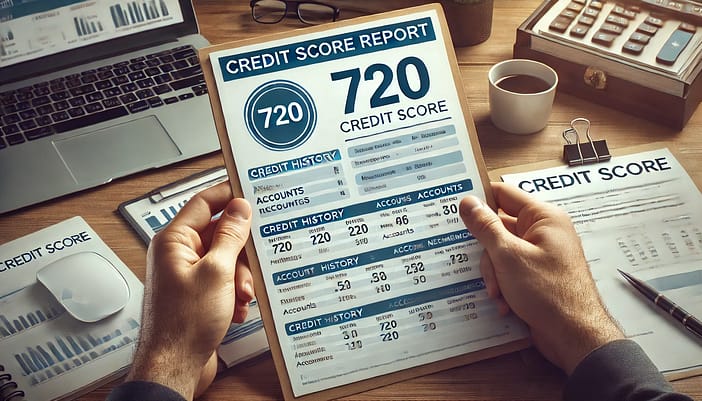Foreword
Welcome to the ultimate guide to financial literacy, where your journey towards financial mastery and empowerment begins. This comprehensive resource isn't just another article; it's your roadmap to understanding and conquering the complexities of personal finance, from budgeting and saving to managing debt and building credit.
Get ready to transform your financial future and unlock a life of confidence and freedom as you delve into actionable insights and strategies designed to help you achieve your dreams and aspirations.
If you like this article, make sure to check out our free financial literacy course to learn comprehensive strategies to manage debt, boost your credit score, and confidently make financial decisions.
Get the all details at the end of this guide.
Unlocking Financial Literacy: A Path to Empowerment and Prosperity

Unlocking the door to financial literacy can be a life-changing journey. It enhances your financial well-being and enriches your overall life experience. Imagine having the ability to navigate personal finance complexities with confidence—understanding how to budget effectively, save for your goals, and make informed investment decisions. This article is designed to illuminate the path to financial mastery, equipping you with essential knowledge and practical strategies that can pave the way for a more secure and prosperous future.
As you delve into this guide, you will discover answers to the most pressing questions surrounding financial literacy. From demystifying budgeting and saving to exploring effective money management techniques, you will find actionable insights that can lead to significant improvements in your financial situation. Each section is crafted to inspire you and provide the tools necessary to take charge of your finances, empowering you to achieve your dreams and aspirations.
Imagine the freedom that comes with financial independence—no longer feeling overwhelmed by debt or uncertain about your financial choices. By embracing the principles outlined in this article, you can transform your relationship with money, turning it from a source of stress into a powerful ally. The knowledge you gain here is not just information; it is a stepping stone toward a brighter, more secure future. So, take this opportunity to invest in yourself—your financial literacy journey begins now, and the rewards are boundless.
Understanding Financial Literacy
Definition and Importance

Financial literacy encompasses the knowledge and skills necessary to make informed financial decisions that positively impact your life. It’s about understanding concepts like budgeting, saving, investing, and managing debt effectively. When you grasp these principles, you gain the confidence to navigate your financial landscape, leading to better money management skills.
Many people wonder, "How can I create a budget that works for me?" The answer lies in tailoring your budget to your unique situation—tracking expenses, prioritizing savings, and setting realistic goals. Embracing financial literacy opens doors to financial independence, allowing you to sculpt a future where your dreams are not just aspirations but achievable realities.
Common Misconceptions

Many people harbor misconceptions about financial literacy, believing it's too complicated or only for the wealthy. In reality, personal finance education is accessible to everyone. It's not about knowing every investment strategy; it's about grasping essential money management skills that can transform your life. Budgeting and saving are not daunting tasks but empowering practices that help you take charge of your finances.
Understanding that financial literacy equips you to make informed choices dispels the myth that it’s beyond reach. By shedding these misconceptions, you can unlock your potential, paving the way for a future where financial confidence leads to lasting success.
The Journey to Financial Literacy
Assessing Your Financial Situation

To embark on your journey toward financial literacy, begin by assessing your current financial situation honestly. Take stock of your income, expenses, debts, and savings. This self-reflection lays the groundwork for setting achievable financial goals. Ask yourself, "What do I want to accomplish financially?" Whether it's paying off debt, saving for a home, or building an emergency fund, clear goals will guide your budgeting and saving efforts.
Remember, financial freedom isn't a distant dream; it's within your grasp. With determination and a strategic approach, you can cultivate essential money management skills that empower you to create the life you envision.
Creating a Personalized Budget

Creating a budget that works for you is a vital step in mastering money management skills. Start by examining your income and expenses—this honest assessment serves as a foundation for your financial journey. Prioritize your needs over wants and allocate funds accordingly. It’s not just about restricting spending; it’s about empowering your future.
Many people ask, “How can I effectively save while still enjoying life?” The answer lies in finding balance, allowing room for both savings and enjoyment. Investing in your financial knowledge today leads to a brighter tomorrow, where saving becomes a habit that nurtures your dreams and secures your independence.
Core Components of Financial Literacy
Budgeting
Budgeting is the foundation of financial literacy. It involves creating a plan for how you will spend your money each month, ensuring you live within your means and allocate funds towards savings and investments. Start by tracking all your expenses for a month to see where your money goes. Use this information to categorize your spending and identify areas where you can cut back. Set realistic spending limits for each category and stick to them. Remember, a budget is not about limiting your freedom; it’s about giving you the freedom to spend without guilt.
Saving and Investing
Saving is setting aside money for future needs, while investing involves using money to earn a return. Both are crucial for building wealth and achieving financial goals. Begin by establishing an emergency fund with three to six months' worth of living expenses. This fund acts as a financial safety net. Next, focus on your short-term and long-term goals. For short-term goals, such as a vacation or a new gadget, use a high-yield savings account. For long-term goals like retirement, consider investing in stocks, bonds, or mutual funds. The key is to start early and be consistent.
Debt Management
Understanding how to manage debt is a key aspect of financial literacy. This includes knowing the difference between good and bad debt, how to pay off debt efficiently, and strategies for avoiding excessive debt. Good debt, like a mortgage or student loan, can help you build wealth over time, while bad debt, like credit card debt, can hinder your financial progress. Prioritize paying off high-interest debt first and consider using the snowball or avalanche method to reduce your debt systematically. Always aim to pay more than the minimum payment to reduce interest charges and get out of debt faster.
Credit Scores
Your credit score is a numerical representation of your creditworthiness. It affects your ability to borrow money, rent an apartment, and even get a job. Understanding how to maintain a good credit score is essential for financial health. Pay your bills on time, keep your credit card balances low, and avoid opening too many new accounts in a short period. Regularly check your credit report for errors and dispute any inaccuracies. A good credit score opens doors to better interest rates and financial opportunities.
Overcoming Challenges and Roadblocks
Managing Debt Proactively

Dealing with debt can feel overwhelming, but it’s essential to approach it with a proactive mindset. Start by analyzing your debts, identifying high-interest ones first, and creating a repayment plan that prioritizes them. Many adults often wonder, "How can I manage unexpected expenses without derailing my budget?" Building an emergency fund is the answer; even small, consistent savings can provide a cushion for life's surprises.
Building an Emergency Fund

Building an emergency fund is a crucial step in safeguarding your financial future. Imagine facing an unexpected expense, like a car repair or medical bill, without the stress of derailing your budget. Start by setting aside a small portion of your income each month; even modest contributions can add up over time.
Many people wonder, "How much should I save?" Aim for three to six months' worth of living expenses to create a solid cushion. Additionally, don’t hesitate to seek professional financial advice when needed. Experts can provide tailored strategies that enhance your money management skills and ensure your goals stay within reach.
Importance of Credit Awareness

Understanding credit is crucial; monitor your credit score regularly and make timely payments. Empower yourself with knowledge, as mastering these aspects of personal finance education transforms challenges into opportunities for growth and financial stability.
Cultivating a Mindset of Financial Empowerment
Changing Your Relationship with Money

Changing your relationship with money begins with understanding its true role in your life. Instead of viewing it as a source of stress, see it as a tool for empowerment and freedom. Many individuals grapple with the question, "How can I shift my mindset about spending and saving?" The answer lies in cultivating gratitude for what you have while setting clear intentions for your financial future.
Embrace budgeting not as a limitation, but as a roadmap guiding you toward your aspirations. By prioritizing saving and making informed choices, you transform your financial landscape, creating opportunities that align with your dreams. Your journey to financial harmony starts now!
Practicing Financial Mindfulness

Practicing financial mindfulness means being fully aware of your financial decisions and their impact on your life. Start by evaluating your spending habits; ask yourself, "Do my purchases align with my values and goals?" Embrace budgeting as a conscious choice rather than a chore. By tracking your expenses and identifying patterns, you empower yourself to make intentional decisions that fuel your aspirations.
Cultivating a habit of saving, even in small amounts, reinforces your commitment to financial health. Remember, each mindful decision shapes your financial future, transforming stress into confidence and paving the way for a life where your financial dreams become reality.
Celebrating Small Victories

Celebrating small victories in personal finance is crucial to sustaining motivation on your journey to financial literacy. Each time you stick to your budget, save a little extra, or pay off a debt, acknowledge that achievement. These milestones, no matter how minor they seem, create a positive feedback loop that reinforces your money management skills.
Many ask, "How can I stay motivated when progress feels slow?" The answer lies in recognizing that every small step compounds into significant change. By celebrating these victories, you cultivate a mindset of abundance, empowering yourself to tackle larger financial goals with confidence and enthusiasm.
Staying Motivated on Your Financial Literacy Journey

Staying motivated on your financial literacy journey requires intentionality and a positive mindset. Regularly revisit your financial goals, reminding yourself of the freedom and security they promise. Many often ask, "How can I maintain momentum when faced with setbacks?" Embrace each challenge as a learning opportunity rather than a roadblock.
Celebrate every small win, whether it's sticking to your budget or saving a little extra each month—these victories fuel your progress. Surround yourself with supportive communities or resources that inspire accountability. Remember, financial literacy is a marathon, not a sprint; persistence will empower you to achieve lasting financial transformation.
Conclusion: Empower Your Wallet, Empower Your Life
Recap of Financial Literacy Importance
Financial literacy is not just a buzzword; it is a fundamental skill set that can significantly enhance your life experience and financial well-being. The ability to understand and manage your finances effectively opens doors to greater opportunities, allowing you to navigate life's challenges with confidence. Imagine possessing the tools to create a budget, save for your aspirations, and make informed investment choices—these skills can transform your relationship with money and empower you to achieve your dreams.
Encouragement to Take First Steps
Taking the first steps toward enhancing your financial knowledge and skills is an empowering journey. Start by embracing the idea that financial literacy is within your reach. Begin with small actions, such as tracking your spending or setting a simple budget. Ask yourself, “What financial goals truly matter to me?” This introspection will guide your path. Remember, every little effort counts; each decision you make strengthens your money management skills.
Transform budgeting and saving from daunting tasks into empowering tools. With determination and a willingness to learn, you can unlock a future where financial confidence fuels your dreams and aspirations.
Emphasizing the Transformative Power of Financial Literacy
Financial literacy is a powerful catalyst for transforming your life and achieving your goals. By mastering money management skills, you gain the ability to make informed decisions about budgeting and saving, paving the way for a fulfilling existence. Imagine setting clear financial objectives—whether it’s buying a home, traveling the world, or securing your retirement—and having the knowledge to realize them.
Many ask, "How can I leverage my finances to create the life I desire?" The answer lies in understanding your financial landscape and cultivating habits that align with your aspirations. Embrace this journey, and watch as your dreams become attainable realities.
By following this inspirational path to financial literacy, you can gain the confidence and knowledge needed to make sound financial decisions, build a secure future, and ultimately lead a more empowered and fulfilling life. Remember, it's never too late to start your journey towards financial empowerment!
